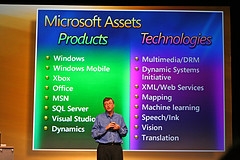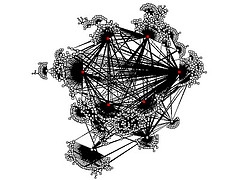Does the software project you’re currently working on have a plan? It doesn’t have to be an elaborate gantt chart — frankly, gantt charts are pretty worthless though they force us to think through a variety of project issues. It doesn’t have to be a massive missive either — no one reads those things anyway. […]
Month: August 2013
The Observer Effect Works But Not for Long
Have you ever heard of the observer effect? It’s the scientific principle asserting that observing a process or action has an effect on the outcome. For example, I’m sure you’ve felt the pressure of having someone stare at you while you’re trying to do something. If you let it get to you, it effects your […]
Microsoft Needs a New Beginning
Steve Ballmer has decided to retire from Microsoft — I’m sure it wasn’t voluntary. Many investors have long sought his resignation because Microsoft’s stock performance has lagged for a long time. In the last five years, Microsoft’s stock price is up about 25% while Apple’s is up 183% — 25% vs 183%. It’s long past […]
With Agile Software Development, Your Mileage Will Vary
Different types of organizations have different goals and priorities when developing software. That’s one of the major reasons why software developers disagree on development approaches and techniques. In this post, I’ll examine a few types of companies and how agile development techniques might apply to them. There’s no one-size-fits-all approach to software development. The approach […]
Being Agile and Procrustean Don’t Mix
Scaling agile software development techniques to enterprise levels has plenty of challenges. Getting a small team — say 5 to 7 people — working together and building great software solutions happens regularly. Getting large teams — say 500 to 700 people — to do the same is an engineering feat that challenges our human abilities. […]
The 7 Benefits of Reducing Software Project Scope
Scope creep. Virtually every software project suffers from it. Development teams start out with elegant and simple ideas. They toss them around amongst themselves and get excited about the prospect of delivering great software. They engage more people in the effort such as business stakeholders, power users, and senior managers. As they do, features get […]
We Don’t Need To Be Smarter. We Need To Work Smarter.
Are software professionals smarter than other business professionals? At times, we seem to think we are but let’s examine that premise more closely. Consider this. National restaurant chains spend millions of dollars test marketing new menu items. For example, Burger King, McDonald’s, Dunkin’ Donuts, Olive Garden, and Taco Bell invest boatloads of time and money […]
Poor Quality Software Is Never Done
Defects. Every software package has them. Some defects are minor and don’t interfere with the operation of the system. Others are ugly, causing business users to lose data. Some are repeatable and consistent. Others are hard to replicate and tough to track down. Part of what makes defect repair so difficult is that we often […]
Our Software Focus Needs to Shift From What to Why and How
I’ve grown tired of desktop software that gets ever more complex and correspondingly difficult to use. Do we really need all the features and functions being thrown at us? Just because a feature can be added to the software, doesn’t mean it should. Software engineers don’t get paid by the feature. End users are just […]
When You Learn Faster, You Go Faster, But It Takes Time
Speed. It’s a frequent topic among software development teams. How fast can the team deliver product X? Can the team cut a few weeks off the development schedule? If the team switches from waterfall to Scrum, how much time will be saved on the delivery schedule? Those are all the wrong questions though they are […]
The Perfect Software Project Is Mythical. It Never Happens.
I have a question for you. How do you define a successful software project? Here are some choices. If you don’t like any of them, please leave a comment with your definition. A. The product is delivered on time but over budget. B. The product is delivered on budget but late. C. The product meets […]
Technical Debt Often Plagues Legacy Software Systems
In a perfect world, every software development project would start with a clean slate — no existing code base, no established user community, and no outstanding defects. Wouldn’t that be sweet! It rarely happens. Most software projects start with a truckload of baggage — crappy code, impatient users, incomplete features, frustrating user experiences, slow performance, […]












